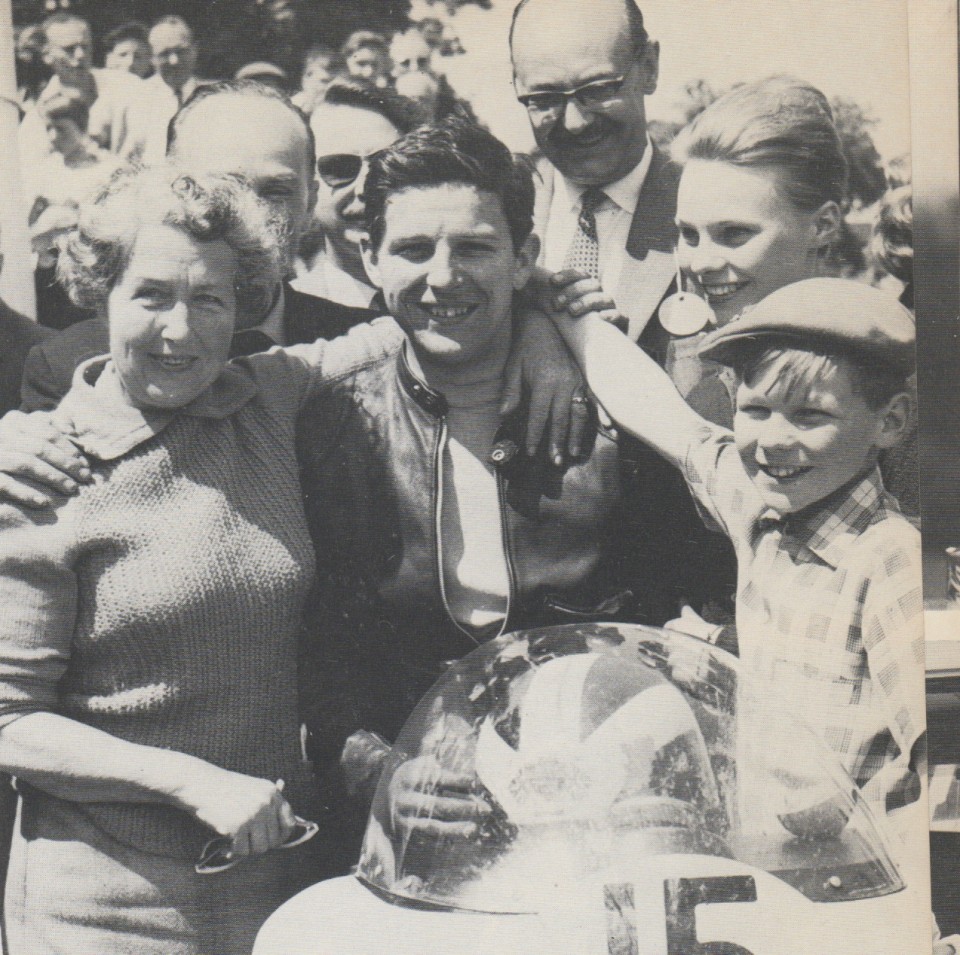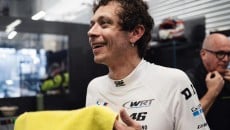What’s the best way to remember one of the greatest riders of all time? Well, that's rather simple: having him talk about himself. From the preface of the book, Phil Read, The Real Story, by the late Chris Carter, the voice of the TT, Phil narrates one of the most iconic stories of his long and victorious career: when he fled from the hospital in Modena, wearing only a fur coat, after an accident in one of those races, in Modena, before the World Championship began.
Read was at the end of his career by then, but we can find him again among these lines. The tough, bitter man and rider who, by reaching his goals, was able to buy the world and then gamble it away at the roll of the dice as if he were in a casino. That was the Continental Circus. Those were the riders. When we talk about personalities, we’re not looking for clowns but for real men. As Phil says in his last lines: “Many things happened. Not all of them particularly pleasant, not all of them to be proud of.”
Good bye Phil. Or, rather, Godspeed. Let us cherish that fond memory of that lunch at Borgatella di San Lazzaro, with a trio of first courses. You came to the MotorShow, with the latest of your conquests. Motosprint had paid the bill, because you had already burned all your bridges at the time, without even turning back to watch them collapse.
(p.s.)
CHAPTER ONE, Spring 1976
It was one of those bitterly cold Modena days: snow on the Apennines, and an icy wind that cut through normal protective clothing. I was wearing a hooded fur coat I'd bought in Alaska over my racing leathers and I was still shivering. Little wonder that people around the track were lighting fires that sent clouds of smoke billowing all over the circuit. Geoff, my mechanic, straight from a Brisbane summer was anything but complimentary about the weather.
We were down there in Modena, the new Team Read, for those early season Italian internationals, trying to sort out the new Suzukis before the start of the World Championship Grand Prix meetings. To date, 1976, did not look like being the most auspicious of years. At the beginning of the month, March, I had lasted just six laps of the Daytona 200 classic on my Yamaha. A week later at Misano, Ago looked out from his hotel window, saw that it was cold, wet and miserable and decided not to race. The meeting was cancelled! Philip William Reed wasn't the only one disgusted; there were some 6,000 disappointed fans and a lot of unhappy riders.
Happily though, it takes more than a spell of cold weather to stop racing at Modena, breeding ground of Ferraris and Maseratis. And racing we were. At least some people were. My race lasted as far as the first corner. Quite what happened, I don't remember: others have since given me a variety of versions. Apparently, Gianfranco Bonera, my old MV teammate, went into a slide at the corner, a slow left-hander, and I put my bike down to avoid hitting him. Mind, you, I'd have done the same for anyone but Gianfranco's a special friend; I'd even lend him the key of the Rolls. Unfortunately, I didn't account for the riders behind us. Someone ran over me; I remember that. I'm told someone else went over my head, I don't remember that. But it's a damn good advertisement for Premier Helmets that I'm able to tell the story today.
Over in the pits, Geoff, Jim another mechanic and Vittorio Fabbri, who looks after my Italian interests, were waiting for me to come around. No sign and their worst fears were confirmed when they heard the bells of the ambulance, then saw it haring towards that corner. Off they raced, Geoff and Vittorio, only to arrive in time to see the ambulance driving off and a pair of red Read boots sticking out from the back.
I'm told I was in a pretty bad way, even needing heart resuscitation in the ambulance. But I was conscious by the time Geoff and Vittorio arrived at the hospital. The hospital room was already full of Italians, some of whom I recognised, others I maybe didn't even know. In fact, there seemed to be a lot I didn't know, probably because I was still suffering from concussion. For one thing I didn't know where I was and when Geoff fought his way through the crowd, I kept asking him. What had happened.
“It was just like that crash you had at Brands,” he said.
“What crash at Brands?” I asked. “I never crashed at Brands.”
“Don’t you remember? End of last season, when you broke your ribs.”
“No, never crashed at Brands,” he persisted. “Where am I? What happened?”
He tried to keep talking to me quietly but it was hopeless. Confusion rained in my head and around my bed. There were doctors telling me I needed two weeks’ rest; other people, ignorant of the medical reasons, were telling me I could get out of bed that very moment and go back to my hotel. Well, I've never been one for staying in bed longer than I have to, not without some incentive anyway, and encouragement like that was all I needed. Geoff had brought the Alaskan fur coat with him, so wearing that, my racing boots and very little else, I discharged myself. The following day, the Italian papers featured pictures of this mad fur-coated Englishman, marching out of hospital. I don't think many of the English papers gave me the same publicity, but maybe I should be glad of that. Who knows?
Back at my hotel Geoff and Vittorio threw out some of the camp followers and gradually restored order. We had something to eat. I was starving and then I went up to bed and slept long and well. The next morning, I drove the Rolls down to Bologna and flew home.
What was worrying me most of all was whether or not I could race the following weekend in the international at Imola. It would be my last opportunity to test the Suzuki against Agostini's MV before the Grand Prix, but would my doctors let me race. The answer was a kind of yes, but only if I wanted to badly enough. They wouldn't advise it. What the hell, I thought. I'd been advised not to race before and won vital Grands Prix. It was not as if I wanted to win at Imola, but I did need to see how the Suzuki would go.
Consequently the following weekend saw me back in Italy at Imola. I wasn't feeling great. In fact there were times when I felt bloody rotten when I got on the bike to ride in practice, it was a very fragile Phil Read who finished well down the qualifying list. Still, I was happy with the bike and when in the race I was able to sit on Ago’s tail for most of the distance, I almost forgot about the crippling pain in my side. At the finish, although I had dropped back a bit among the tailenders, I was only three and a half seconds down on the MV. I was happy. The Suzuki was competitive. Physically, though, I was shot. I couldn't even use the clutch to stop the bike and had to stall it in fourth. Somehow I managed to get off and hand the bike to Jim. Back in the caravan, I collapsed.
You might say a more sensible person would never have considered riding in the Imola 200 the next weekend; would have taken a few weeks off to prepare himself for the first round of the world championships at Le Mans on 25 April. But look at the people who get to the top. They're the ones who are out there every day, rain or shine. They don't sit on their backsides living on sick pay or social security. I'm a motorcycle racer. It has been my career. My whole life. There was a race at Imola on 4 April. I was going to ride in it.
My body had other ideas. During the week, I’d caught ‘flu’ and then it came to light that I'd broken a rib in that little episode at Modena. No wonder my side was hurting. Nevertheless I was out there at Imola for the practice rounds, and this time, my body tired of being torn apart by Read bloody-mindedness, threw down a handful of aces. I contracted bronchial pneumonia and that was that. Madeleine put her foot down. We were going back to England, but not before one final aggravation. The organisers refused to pay over the money I'd been promised - a continuing saga in my dealings with Italian organisers.
Back in England, the doctors, hiding their “ We told you so” expressions rather well, ordered a complete break; a proper holiday, a family holiday. I was no longer in the mood to argue and the next five days found us and the boys, Pip and Mark, at Restronguet in Cornwall. No doubt the doctors were thinking of longer than five days when they ordered a rest. But I had to captain the British team in the Transatlantic meeting against the Americans, didn't I? You don't just give up an honour like that because you're feeling a bit ropey. That short spell away from the pressures of racing, running a team and my other business interests, also gave me a chance to sit back and think of one or two other matters. Perhaps, because I was now in my twenty-first year of racing, people had been speculating that 1976 would be my last season. Myself, I didn't know. Certainly at 37, I felt I might have a bit longer to do, but it's a long haul around the continent in the fight for World Championship points. Down there in Cornwall, away from the sound of revving motorcycles, and ringing telephone, playing with Pip and Mark, taking time over meals, I began to see what I was missing: a family life.
There was also the question of an autobiography. I'd already spent some time earlier in the year with help from the BBC's motorcycle man, and Motor Cycle sports editor, Chris Carter, putting a lot of material on tape. Chris had also done a lot of research for me just in case my memory let me down.
What I didn't want though, was one of those books that go on and on listing events and achievements, without ever really showing the real person and the happenings behind the deeds. I wanted if possible to look at myself objectively and say, “This is the real Phil Read”. Probably, in saying that, I was just being myself; saying what I've been saying for as long as I can remember. “Don't bother with the bullshit. Let's have it straight”. Nonetheless, it was a sobering thought. A lot of things had happened, not all of them particularly pleasant, not all of them things to be proud of. And when you're looking back over thirty-seven years, those thirty-seven years seem a mighty long time when you've tried to fill every moment of them.
From the book: Phil Read, The Real Story by Chris Carter
Photo: Read at his first victory in the TT in 1961. The child is non other than Barry Sheenen; Phil's mother and Barry's sister, Maggie, in the background.









